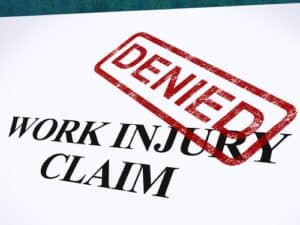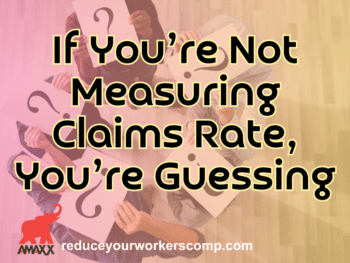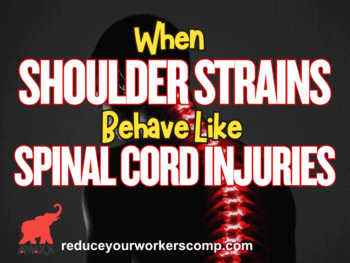For the most part, workers compensation claims are generally compensable. The general public thinks the opposite — that all insurance companies want to deny injury coverage.
In actuality, it’s estimated that 80 to 90 percent of claims are initially accepted. However, claims can be denied later down the road for various reasons. How does an employer properly dispute a claim when there is a compensability question?
4 Strategies to Dispute a Workers’ Compensation Claim
- If a reported claim is questionable, the adjuster needs to know right away so a proper dispute for investigational purposes can be filed.
At the time a claim is reported to the carrier, employers will know more than the adjuster. Once the adjuster receives the file, he or she sets up the claim, contacts the employee and employer, reviews medical records, and only then makes an initial decision.
But if the employer calls the claim questionable, it should be marked as questionable right away so the adjuster can file a dispute that the claim’s compensability is under investigation. Most jurisdictions have a time limit on how long the claim investigation can be. If the adjuster fails to file for the extension within the time limit, the claim could be conceded as compensable — at least in the beginning.
This leads to leakage because claims dollars are being spent on a claim that may not be compensable. It takes time to take statements, get medical records, get past records, do background checks, etc. If an adjuster can file an initially extension they can take time to investigate the claim and make the proper decision on compensability.
Generally, questionable claims receive more of the adjuster’s investigative attention. This is especially true when the employer notes on the first report of Injury that the claim is questionable; this automatically raises a red flag for the adjuster. The adjuster will review the claim’s initial parts and form questions to ask the employee when taking their statement.
An adjuster’s first call will be to you, the employer, asking why the claim is questionable. Employers can talk to witnesses, and follow up on leads made by other employees that a claim may not be 100 percent compensable and pass that information on to the adjuster in the beginning of their investigation.
All of these issues greatly help the adjuster, and after the investigation is completed, a proper decision can be made on the claim as to overall compensability.
Click Link to Access Free PDF Download
“How Do I Get My Adjusters To Follow My Account Handling Instructions?”
-
What if a claim starts off as compensable then needs to be disputed later on?
A claim can start off as compensable and then change. For example, an employee strains his back while working. There was a witness, and it was reported promptly. The worker was sent for treatment the same day. Usually, benefits will be conceded, and the claim will be accepted into initial stages.
But, a month later the claimant tells the doctor he hurt his back the weekend before the work injury doing yard work, then he made it worse while working. This should lead to a dispute in all cases. The adjuster has no way of knowing how bad the claimant had injured themselves while outside of work, and most often the injured worker will not be able to go back and say the injury/ongoing disability is 100 percent work-related.
Unfortunately, these cases are rare. Claimants are often intelligent, and even if this did occur most do not go to an occupational clinic and tell the doctor about how they injured themselves outside of work. But it does happen, and the adjuster should catch this every time. This can be seen in emergency department records, too.
-
What if a worker is injured doing a simple task, and the diagnosis is worse than it should be in relation to what the worker was doing at the time of injury?
For examples like this, adjusters rely on the medical records and the mechanism of injury. For example, a claimant states she sustained a lumbar strain while at work lifting a 20-pound tote of parts. Then the doctor finds all sorts of objective evidence on exam of severe, disabling back pain. Something is not right. Lifting 20 pounds should not have such excessive force that it herniates multiple lumbar discs. The adjuster should seek an opinion of a peer-review physician or medical advisor to comment on the severity of symptoms in relation to the stated work injury.
This type of scenario is a lot more common than one would think. The general public probably has never had a diagnostic workup on their spine or an MRI test. If a claimant sustains a simple injury and the resulting MRI shows all sorts of issues, it does not mean they all are related to the work injury.
An employer also has to beware of false positives. Just because someone has multiple levels of disc bulges, does not mean all of those are related to work. Research shows workers of all ages and occupations can have a varying level of degree of spinal issues. It is the adjuster’s job to determine what, if anything, is related to the work injury, treat those issues, and deny ongoing treatment for the rest of the worker’s spinal problems.
-
If you know the injury is not legitimate, should you file the claim anyway?
The answer is in all cases is YES. It is the adjuster’s job to determine if an injury occurred out of the course and scope of employment. A human resources professional is not an adjuster, and if a worker comes to you and alleges a work injury, no matter what the circumstances, it should be reported to your carrier/TPA. The adjuster has training and certification, and he or she is qualified to deny claims. Some jurisdictions can carry heavy penalties for failure to report a work injury to the carrier. You do not want to be hit with one of those penalties. The company pays a carrier’s premium to be protected in insurance matters. The employer should gather all the pertinent details and report the claim promptly. Indicate on the first report of injury that the claim is questionable, and go from there. Follow up with the adjuster, and chances are it will be denied as you suspect.
Summary
There are several ways to dispute a questionable claim. But the most important thing an employer can do is gather all the information on the claim before reporting it promptly to the carrier. Then, follow it up with a phone call to the adjuster. The more you work together with your carrier, the better chance the questionable claims will be denied.

Author Michael Stack, CEO Amaxx LLC. He is an expert in workers’ compensation cost containment systems and helps employers reduce their workers’ comp costs by 20% to 50%. He works as a consultant to large and mid-market clients, is a co-author of Your Ultimate Guide To Mastering Workers Comp Costs, a comprehensive step-by-step manual of cost containment strategies based on hands-on field experience, and is the founder & lead trainer of Amaxx Workers’ Comp Training Center, which offers the Certified Master of Workers’ Compensation national designation.
Contact: mstack@reduceyourworkerscomp.com.
Workers’ Comp Roundup Blog: http://blog.reduceyourworkerscomp.com/
©2022 Amaxx LLC. All rights reserved under International Copyright Law.
Do not use this information without independent verification. All state laws vary. You should consult with your insurance broker, attorney, or qualified professional.






























